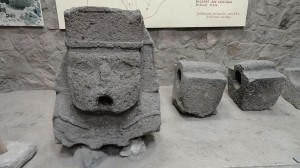
Image credit: Monolito Wari – Ayacucho, Peru taken by Fer121 under Public Domain.
The constant search and discovery of archeologists are very important as they provide answers to the questions and curiosities that we have regarding ancient civilizations. Sadly, in many cases, finding artifacts that are intact is extremely difficult. The items are either buried way too far from where they were expected to be. If not, they might have been looted long before archeologists could come and analyze the artifacts. However, a recent discovery revealed a glimpse of an ancient civilization in Peru that dates as early as 700-1000 AD. The said discovery is the imperial tomb of the Wari. This ancient Wari civilization has not been well-documented due to limited artifacts discovered. Thus, this recent discovery is considered a treasure in understanding this seemingly lost part of history.
The Secret Discovery
The problem when archaeologists find something and announce it to the public is that villagers nearby come over to loot the findings. Therefore, the important artifacts are gone before they could be studied. However, when the team of Milosz Giersz, a University of Poland archaeologist, found the burial chamber in Peru, they decided not to reveal it to the public. Their team decided to collect the artifacts that they could find before making a public announcement. They painstakingly unearthed thousands of artifacts over the course of several months. They found gold, silver, and tools, and even mummified bodies. These items were said to be located in a burial chamber.
The Revelation in this Discovery
First of all, this discovery shed some light in regard to the Wari culture, which predates the well-documented Inca culture of Peru. It was revealed that during their time, the Waris were extremely powerful. They had magnificent infrastructure that depicted their power. The bodies of three entombed queens were adorned with jewelry, signifying that they were powerful female leaders. The archeologists also found bodies buried with the queens depicting that human sacrifice was part of their culture. The presence of insects on the bodies of the queens indicated that some other rituals were performed, most likely some form of royal ancestral worship, long after they have passed away.
A Change of Perspective
The discovery about female leaders also changed the perception of how women were treated in the past. It is believed that throughout history, men were dominant. In the olden times, a patriarchal society was evident anywhere in the world. However, with how these female leaders were worshipped and adored, it showed that in some cultures, other beliefs were followed.
Just the Beginning
The team that led this fantastic discovery believes that it is just the beginning of everything. They still have 8 to 10 more years to fully uncover the secrets of the Wari culture. In fact, they believe that if more secrets of this culture will be revealed, the Wari leaders can even be compared to Alexander the Great in terms of power and influence.














Sorry, the comment form is closed at this time.